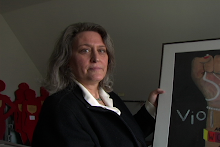As we gear up our outreach and engagement efforts this summer, it's been gratifying to get to know some of the educators who plan to use "Power and Control" in the classroom. I think that showing the film in colleges -- to students in social work, sociology, criminology, women's studies, law and medicine -- will be the way the film has its most powerful direct impact.
College students are still reading and thinking about the world, still asking questions and engaging in debate. Ten years after college (at least in my case), that kind of intellectual growth slows.
At the same time, the film will be providing fresh background to students. The current generation has grown up in a time when feminism and the battered women's movement have not, unfortunately, been key social concerns. This has dawned on me at some of the screenings of the film, where most of the people in the audience were over 50.
I'm deeply encouraged by the way a group of students at the Florida State University School of Social Work responded to a screening in the spring. The responses were raves. I'm almost embarrassed to quote from some of the response cards because they sound self serving! But believe me, this project has faced plenty of rejection, so a few nice words also help keep the spirit aloft!
Vicky Verano, the course instructor, was kind enough to send me a thoughtful and thorough note. "Your film is a powerful teaching tool because it provides a look at the Duluth Model and how the Model is used with survivors of domestic violence." During the course of the film, Kim, our main subject, leaves her husband, goes into a shelter, and sets out on a new life. But in the end, she gets back together again with him. Vicky thought this plot line stimulated good discussions in class. "At the end of the movie, some of my students were frustrated that she went back. This opened dialog and provided students to process what 'really' happens when women leave and go back and the importance of not blaming rather than supporting a person's choice."
Here are three comments from students:
-- This is full of valuable info as well as people; it's not about statistics, it's about real people, and I feel that the community needs to see this on a human, reallevel. I also think it's important to see how people disagree on DV (attack on Duluth model, etc) -- knowing all aspects fuels new thoughts!
-- Not everyone involved in this field can manage to stay in touch with the victims. Up to date with the field. And unjudgemental of different situations at the same time. This film is a perfect reminder that life is different for everyone and that education and respect are key, regardless of the gender.
-- We got to see first hand how domestic violence affects lives and we also saw how a group of activists who believed DV was wrong created a program that made a huge impact and changed numerous lives.
Thursday, July 1, 2010
Subscribe to:
Comments (Atom)







